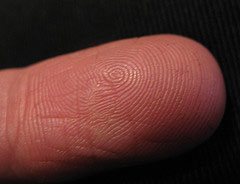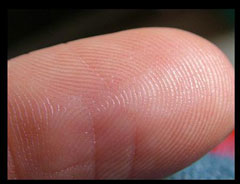 The "fingerprint" which is formed on the tip of the finger by the visible pattern the skin takes is absolutely unique to its owner. Every person living on the earth has a different set of fingerprints. All the people who have lived throughout history also had different fingerprints. These prints remain unchanged throughout one's lifetime unless a great injury occurs.
The "fingerprint" which is formed on the tip of the finger by the visible pattern the skin takes is absolutely unique to its owner. Every person living on the earth has a different set of fingerprints. All the people who have lived throughout history also had different fingerprints. These prints remain unchanged throughout one's lifetime unless a great injury occurs.
 The fingerprints of every person who has ever lived are different. The fingerprints of every person who has ever lived are different. |
That is why the fingerprint is accepted as a very important identity card and used for this purpose around the world..jpg) However, two centuries ago, the fingerprint was not so important, because it was only discovered in the late 19th century that all fingerprints are different from one another. In 1880, an English scientist named Henry Faulds stated in an article published in Nature that the fingerprints of people did not change throughout their lives, and that su spects could be convicted by the fingerprints they left on surfaces such as glass.32 In 1884, for the first time a murder was solved by means of identifying fingerprints. Since then, fingerprints have become an important method of identification. Before the 19th century, however, people most probably had never thought that the wavy shapes on their fingertips had any meaning or considered them worthy of note.
However, two centuries ago, the fingerprint was not so important, because it was only discovered in the late 19th century that all fingerprints are different from one another. In 1880, an English scientist named Henry Faulds stated in an article published in Nature that the fingerprints of people did not change throughout their lives, and that su spects could be convicted by the fingerprints they left on surfaces such as glass.32 In 1884, for the first time a murder was solved by means of identifying fingerprints. Since then, fingerprints have become an important method of identification. Before the 19th century, however, people most probably had never thought that the wavy shapes on their fingertips had any meaning or considered them worthy of note. In the 7th century, the Qur'an pointed out that the fingertips of human beings bore an important characteristic:
In the 7th century, the Qur'an pointed out that the fingertips of human beings bore an important characteristic:
Does man think that We cannot assemble his bones? Yes, We are able to put together in perfect order the very tips of his fingers. (Surat al-Qiyama, 3-4)


